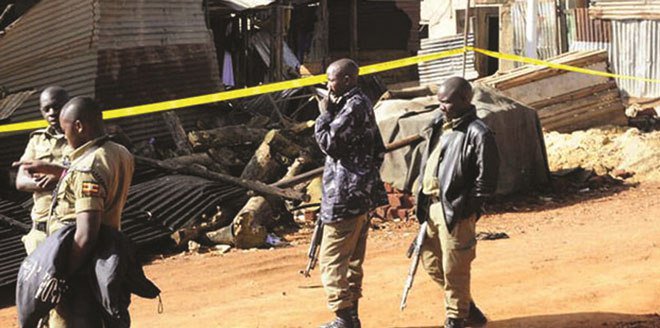
Why Muslim profiling could backfire
Kampala, Uganda | RONALD MUSOKE | It was a nondescript mosque only noticeable because of its makeshift mabati walls in the congested Kisenyi slums, a notorious suburb of Kampala city. But when police raided Usafi Mosque on April 27, allegedly while pursuing a criminal on its wanted list, it became the latest ground zero in the security forces versus Muslims fight.
Weeks later, all that is left of the mosque is a mangled heap of heavily guarded iron sheets and other debris around a small dusty cemented slab about five metres wide and ten in length that used to be the floor of the mosque. Around it are dusty shanties with tiny rooms with shattered window panes that possibly were the residences of the mosque-leaders and, according to police, several abducted young women and children.
Police says it shot two men during the raid and arrested 38 men that it is now calling terrorists. It also says, on its Kampala Metropolitan Police Facebook page, that it “rescued” 18 women and 94 children. The police say they seized 60 rounds of 7.62mm ammunition, one bow and arrows, 23 double edged pangas, and one laptop.
According to police accounts, they stumbled upon the mosque while pursuing a wanted criminal in the murder of Susan Magara, the daughter of a prominent businessman whose failed rescue attempt sucked in President Yoweri Museveni and all top security bosses. Following failure to rescue the woman, Museveni fired the Minister of Security and the head of the police forces.
After the mosque raid, on May 07, Police Spokesperson, Patrick Onyango, told journalists that investigations into the case had widened to include kidnap with intent of murder, defilement, human trafficking and sexual violence.
Onyango said 11 of the 63 young girls, aged 13-15 had tested positive for defilement and seven of them were found to have been impregnated by their abductors. Another four girls told the authorities that they had been defiled.
The investigations now include intent to demand ransom and others, police say and, according to Lt. Col Deo Akiki, the deputy army spokesperson, the army is following on the terroristic nature of Magara’s case.
It appears the former mosque is now a carry-all crime clearing house since police is linking it to a slew of crimes in the Greater Masaka and Kampala area.
But standing next to the rubble of the former mosque, which is still cordoned off with crime scene tape, along a dusty earth road right next to a busy taxi park, it is difficult to imagine how all these people lived in such a tiny hovel.
Mean-looking police officers clad in heavy blue camouflage jackets with AK 47s slung over their shoulders patrol the area and their leader, the OC CID Kampala Metropolitan Police, blocks any attempts to find out what was going on back then and what is going on now.
“You can observe with your eyes but you can’t take photos,” he says and refers any request for information to the force’s information office.
As I walk away my conclusion is that if, as the police allege, this was a terrorist haven, then it puts hiding in plain sight at another level. I am not alone.
Police story doubted
Lucy Akello is an MP and shadow minister for Gender, Labour and Social Development who is concerned about the plight of the women and children who were carted off from the mosque following the raid.
“Unfortunately, I have a lot of unanswered questions about the Usafi mosque attack,” she says about the police explanation.
She says it is difficult to believe that for a country like Uganda, which invests massively in security infrastructure, a terrorist cell can be located right in the centre of the capital city and it takes the police years to notice a problem even after repeated warnings from the community.
Akello’s concern has been raised by local leaders who say they had reported to police that the mosque looked suspicious, that unlike most mosques which welcome all Muslims, this one seemed to have exclusive members, and that megaphones mounted on it spewed suspected radical Islam messages. The local people also noticed that the movements of mosque members were tightly monitored by its leaders.
One local leader said some families had tried to get their children out of the mosque but were blocked by its leaders who were known former rebels of the Muslim-linked Allied Democratic Forces (ADF) whose leader Jamil Mukulu is on trial on terrorism charges. The mosque leader, Abdul- Rahman Faisal, had been arrested weeks before the raid.
Outside security circles, perhaps because the allegation of a terrorist cell appears unbelievable, many are now calling the place an Islamic “radicalisation centre”. And the Muslim community is alleging a witch-hunt.
Hussein Kyanjo, a leader of the Muslim-leaning party, Justice Forum (JEEMA) says there is no credible evidence of criminals found in the former Usafi Mosque and that security force were “staging events” to discredit the Muslim community all over the country.
“As it is today, Muslims are the automatic suspects for any major crime in Uganda,” he says and lists the killing Joan Kagezi, a top state prosecutor, the murder of AIGP Andrew Kaweesi, and the killing of Suzan Magara.
The government spokesperson, Ofwono Opondo, dismissed Kyanjo’s allegations as “utter rubbish” but police credibility is on the line as it has still not paraded the suspects in any court of law. They have also not allowed parents to visit their detained children as has been the case before.
Profiling Muslims
Uganda is a predominantly religious society with 85% of the population professing Christianity, out of which 41% is Catholic; 35% Anglican. The Pentecostal, Seventh—Day Adventist and Orthodox denominations account for 4.6%, 1.5% and 0.1% respectively.
 The Independent Uganda: You get the Truth we Pay the Price
The Independent Uganda: You get the Truth we Pay the Price



